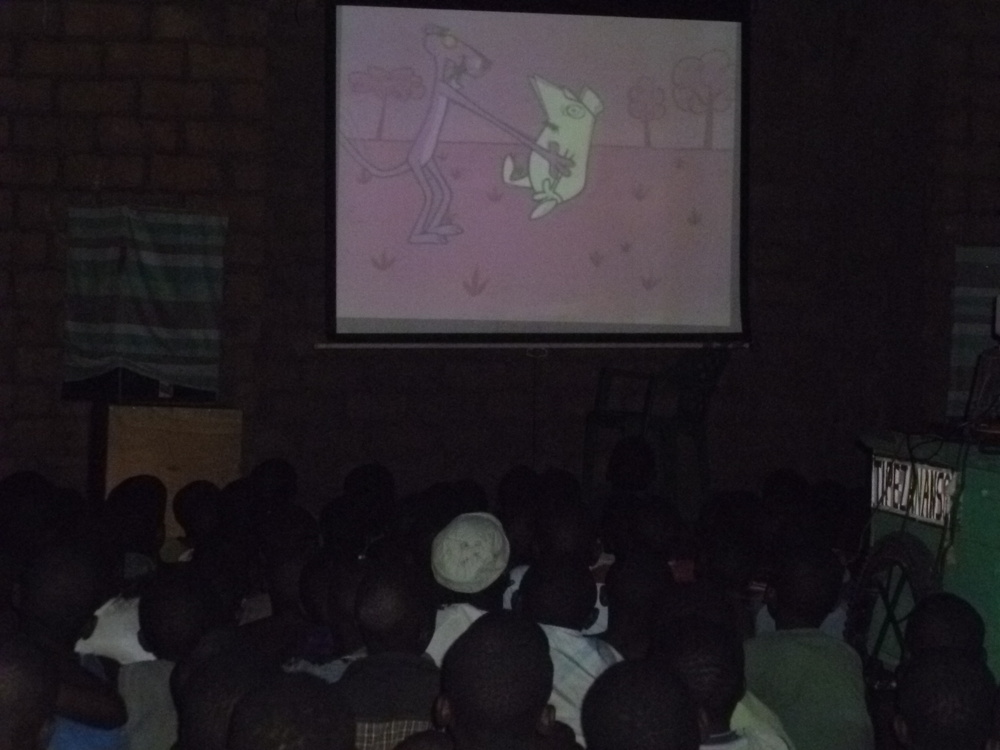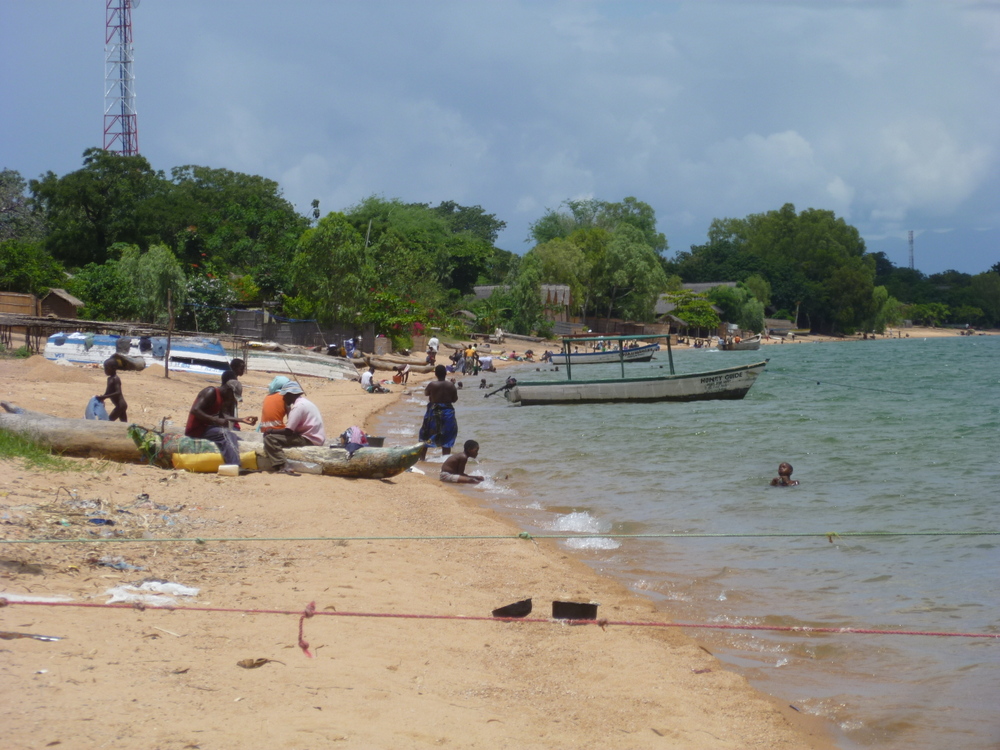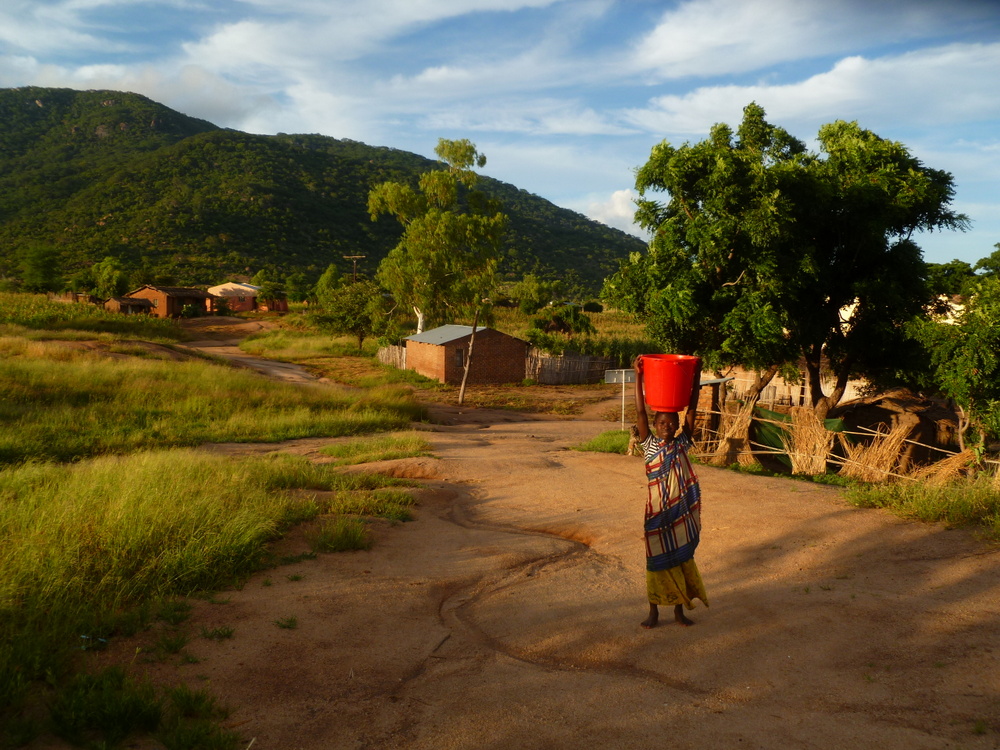|
At the Malawian fishing village of Cape Maclear (also called Chembe), an unexpected invitation led to one of the highlights of our trip. A retired Dutch man named Gerrit van Engelen, who spends several months a year in Cape Maclear, has imported a movie projector and screen. He uses these to show children’s movies to kids under the stars twice a week. Gerrit calls this non-profit project Tipezananso (“We see each other again!” in the local language of Chichewa). In March, Gerrit was staying at the same lodge as us, Fat Monkeys, and he asked us if we’d like to join him for a screening.
We walked with Gerrit through the village of about 15,000, down the dirt road past candle-lit, thatched-roof shops selling bottled sodas, candies, eggs, and milk. The central part of the town had electricity and was buzzing with local people enjoying the cool evening air. A block away, a crowd of kids was still gathered in the last light around a swingset that Gerrit had built. We also passed by a set of monkey bars and a merry-go-round he is constructing. Gerrit told us that this is the only public play equipment in town. Nearly half of the people in Malawi live on less than $1 a day. So although about 45 percent of Malawi’s population is under the age of 15, there is little money available to buy youth the kinds of high-tech toys, backyard jungle-gyms, and Disney DVDs that are common in homes in the U.S. Cape Maclear does have a few movie houses—really just small buildings with walls of sheet metal. When we passed one we could see the light of the film flickering through the cracks and hear the soundtrack of machine guns firing and bombs exploding. Gerrit explained that these places mainly show copies of violent Western films like “Rambo” or “Terminator,” not flicks appropriate for young ones. About five minutes outside of the center of town, we reached the spot where Gerrit’s local team of helpers had already set up the projector and hung the screen against the outer wall of a store. A couple hundred kids were already sitting cross-legged on the dirt ground in front of it. They were watching African music videos. As soon as Gerrit arrived and started fiddling with the projector, the children began to cheer. They knew the real show was about to start. First up were a couple of Pink Panther cartoons. I’d never appreciated before how well these shorts entertain with so few words, almost like pantomime. The kids giggled at the Panther’s shenanigans, always outsmarting Inspector Clouseau. One scene showed the Panther getting burned by a hot water bottle. Gerrit pointed out that the kids in this warm, humid town have probably never seen a hot water bottle, but they roared at the sight of the pink cat jumping out of bed from the heat. After the Panther, Gerrit screened some home videos of the local kids on the swingset. Everyone shouted when they saw someone they knew. They were part of the show, too. By the time of the feature presentation, hundreds more children and their parents had packed in front of the small screen. The stars shown so brightly above, and Venus looked like a spotlight. Everyone got quiet when the movie started. A little girl in a torn pink dress leaned against my leg. Gerrit had hired a Malawian man to give a synopsis of the film’s storyline in Chichewa and videotaped his translation so the kids would know what’s going on. The film would be “Ice Age 3,” but the explanation seemed very serious. Everyone listened intently. The movie rolled, and creatures the kids had likely never heard of—woolly mammoths, a giant sloth, an opossum—wandered about a foreign world of snow and ice on the screen. It didn’t matter that the film’s fantasyland was about as far away from Malawi as you could get. The silliness of the characters’ movements and expressions made everyone laugh. A saber-toothed tiger appeared and was immediately the crowd favorite. It looked close enough to a lioness—a more familiar animal in Africa—that the kids giggled and shouted with great delight as it chased a gazelle and missed. It was like a jar of fireflies set free to hear those kids laugh. When the gazelle did a victory dance, it seemed the kids' hearts did, too. A lot of political changes have happened in Malawi in the two months since we visited. The unpopular President Bingu wa Mutharika died of a heart attack and his vice-president, Joyce Banda, was sworn into the office. She is now the second female president in Africa (Liberia's President Ellen Johnson Sirleaf, a Nobel Peace Prize winner, was the first). President Banda has already fired several top government officials, devalued the currency in order to regain World Bank support and aid from the U.K., and announced she will decriminalized same-sex relationships. For more information on Malawi, check out the country's page on the BBC.
2 Comments
|
Archives
July 2012
Categories
All
|



 RSS Feed
RSS Feed